Capacitors have limitations in energy storage due to low energy density, rapid discharge rate, leakage current, reliability, cost, and voltage limitations.
Limitations of Capacitors in Energy Storage Applications
Capacitors are widely used in electronic circuits for energy storage, power distribution, and filtering. However, they face some limitations in energy storage applications, as outlined below:
1. Energy Storage Capacity
Compared to other energy storage technologies such as batteries or fuel cells, capacitors have lower energy density. This means that they can store less energy per unit volume or weight, limiting their use in high-capacity energy storage applications.
2. Discharge Rate
Capacitors can discharge their stored energy rapidly, which can be both an advantage and a disadvantage. In applications requiring high power for a short duration, this rapid discharge is beneficial. However, for long-duration energy storage applications, the rapid discharge rate means that the stored energy is quickly depleted, making capacitors unsuitable for those applications.
3. Leakage Current
Capacitors exhibit leakage current, which is a small amount of current that flows through the dielectric material even when there is no voltage applied. Over time, this leakage current can cause the capacitor to lose its stored energy, reducing its effectiveness as an energy storage device.
4. Lifetime and Reliability
The lifetime of capacitors can be affected by factors such as temperature, voltage, and humidity. Operating a capacitor outside of its specified range may result in reduced performance or even failure. Additionally, some types of capacitors, such as electrolytic capacitors, are known for their limited lifetimes due to the degradation of the electrolyte over time.
5. Cost and Size
While capacitors are generally smaller and less expensive than batteries or fuel cells, their limited energy storage capacity means that more capacitors are required to store the same amount of energy, leading to increased costs and larger system sizes.
6. Voltage Limitations
Capacitors have a maximum voltage rating, which if exceeded, can cause the dielectric to break down and the capacitor to fail. This limits the applications where capacitors can be used for energy storage, particularly in high-voltage systems.
Conclusion
Despite their limitations, capacitors play a crucial role in various electronic applications. However, their low energy density, rapid discharge rate, and other factors make them less suitable for certain energy storage applications. Research continues to develop improved capacitor technologies, which may overcome some of these limitations in the future.


